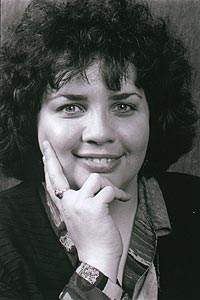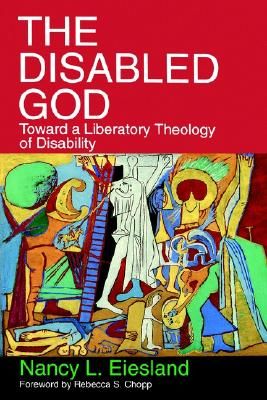A Theology of Disability
By the time theologian and sociologist Nancy Eiesland was 13 years ago, she already gone through 11 operations for the congenital bone defect in her hips and realized pain was her lot in life. So why did she say she hoped that when she went to heaven she would still be disabled? 
The reason, which seems clear enough to many disabled people, was that her identity and character were formed by the mental, physical and societal challenges of her disability. She felt that without her disability, she would “be absolutely unknown to myself and perhaps to God.”
By the time of her death at 44 on March 10, 2009, Eiesland has come to believe that God was in fact disabled, a view she articulated in her 1994 book, The Disabled God: Toward a Liberatory Theology of Disability.” She pointed to the scene described in Luke 24:36-39 in which the risen Jesus invites his disciples to touch his wounds. 
“In presenting his impaired body to his startled friends, the ressurrected Jesus is revealed as the disabled God,” she wrote. God remains a God the disabled can identify with, she argued–he is not cured and made whole; his injury is a part of him, neither a divine punishment nor an opportunity for healing.
I recall a lot of Bible stories about Jesus healing the blind, the lame, the disfigured, the possessed, the hemorrhaging. I don’t recall any stories of a man or woman running away when they heard Jesus was in the neighborhood, afraid he might touch them and change their condition. Just the opposite. But did any melt into the crowd when they heard Jesus was coming down the street? We don’t know. The Bible only describes one group.
A lot of people think of homosexuality as a disability or sickness no one would choose not to be freed from, because of the loss, humiliation, vulnerability, and especially, the pain involved.
In a statement about a year before her death, Eiesland described how her experience of pain changed after an extended stay on medical leave.
“I return with pain,” she said, “but for the first time in at least five years I do not come back on pain killers, mood elevators, or other pharmacological means to dull the ache. I say these things neither to inspire, invite your sympathy or disapproval, nor to chisel into your life in any way. I offer here my experience of pain to remind us that for most of us pain will be an ordinary partner in an ordinary life. The social fiction that long-term pain ought to be treated with more and better drugs is an attractive one.
But even when it is severe and unremitting, I am persuaded that pain is a better friend than is the pain killer. As my life began to reveal, one never can be sure what else within you dies when you try to kill the pain.”
Read her whole statement here.

December 14th, 2017 at 12:18 pm
[…] a newsletter called Impact, Nancy Eisland writes, “In presenting his impaired body to his startled friends, the resurrected Jesus is […]